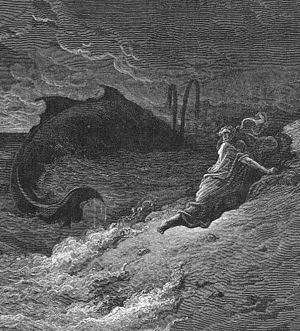What are we to make of Jonah? Sunday we began a new sermon series walking verse-by-verse through this wonderful, though admittedly strange, book. After all, it is a narrative in the midst of prophecy and includes only half a verse of actual prophecy. Some consider this book to be a myth or legend. Others consider it to be parabolic. Such persons, including many scholars, refuse to believe there is much actual history here.
One attractive option is to treat Jonah as a Hebrew midrash. A midrash is a creative commentary on a text of Scripture. In other words, a midrash can be a story used to illustrate a text or lesson of Scripture. Those who make this argument point to Jonah 4:2:
[Jonah] prayed to the Lord and said, “Please Lord, was not this what I said while I was still in my own country? Therefore in order to forestall this I fled to Tarshish, for I knew that You are a gracious and compassionate God, slow to anger and abundant in lovingkindness, and one who relents concerning calamity.
Compare this verse to two others:
Exodus 34:6-7 - Then the Lord passed by in front of him and proclaimed, “The Lord, the Lord God, compassionate and gracious, slow to anger, and abounding in lovingkindness and truth; who keeps lovingkindness for thousands, who forgives iniquity, transgression and sin; yet He will by no means leave the guilty unpunished, visiting the iniquity of fathers on the children and on the grandchildren to the third and fourth generations.”
The similarity between Exodus 34:6-7 and Jonah 4:2 should be immediately obvious. Both describe God as compassionate and forgiving. So could the story of Jonah illustrate just how gracious God is? God is so loving He would even send a reluctant prophet to the Ninevites!
Consider also Jeremiah 18:7-8:
At one moment I might speak concerning a nation or concerning a kingdom to uproot, to pull down, or to destroy it; if that nation against which I have spoken turns from its evil, I will relent concerning the calamity I planned to bring on it.
Note here the theme of God relenting calamity on any nation that repents. That is exactly what Nineveh did. The language of Jonah 4:2 and Jeremiah 18:7-8 mirror each other. Therefore some see Jonah as a type of parable, or midrash, used to illustrates Jeremiah's point.
So is Jonah Midrash? I certainly think there is something to it. Here midrash could be confused or compared with a parable - a term we are more familiar with. Parable's were frequently used by Jesus an so long as we avoid some dangers, I think this might be a helpful interpretation. Certainly there is nothing new in Jonah, although the original readers were likely shocked by its content and implications.
But to say that Jonah is just another example of Hebrew midrash is over simplistic as we shall see.
For more:
Holman Dictionary on Jonah
Bibledex on Jonah
VeggieTales and Jonah
Subscribe to:
Post Comments (Atom)





No comments:
Post a Comment